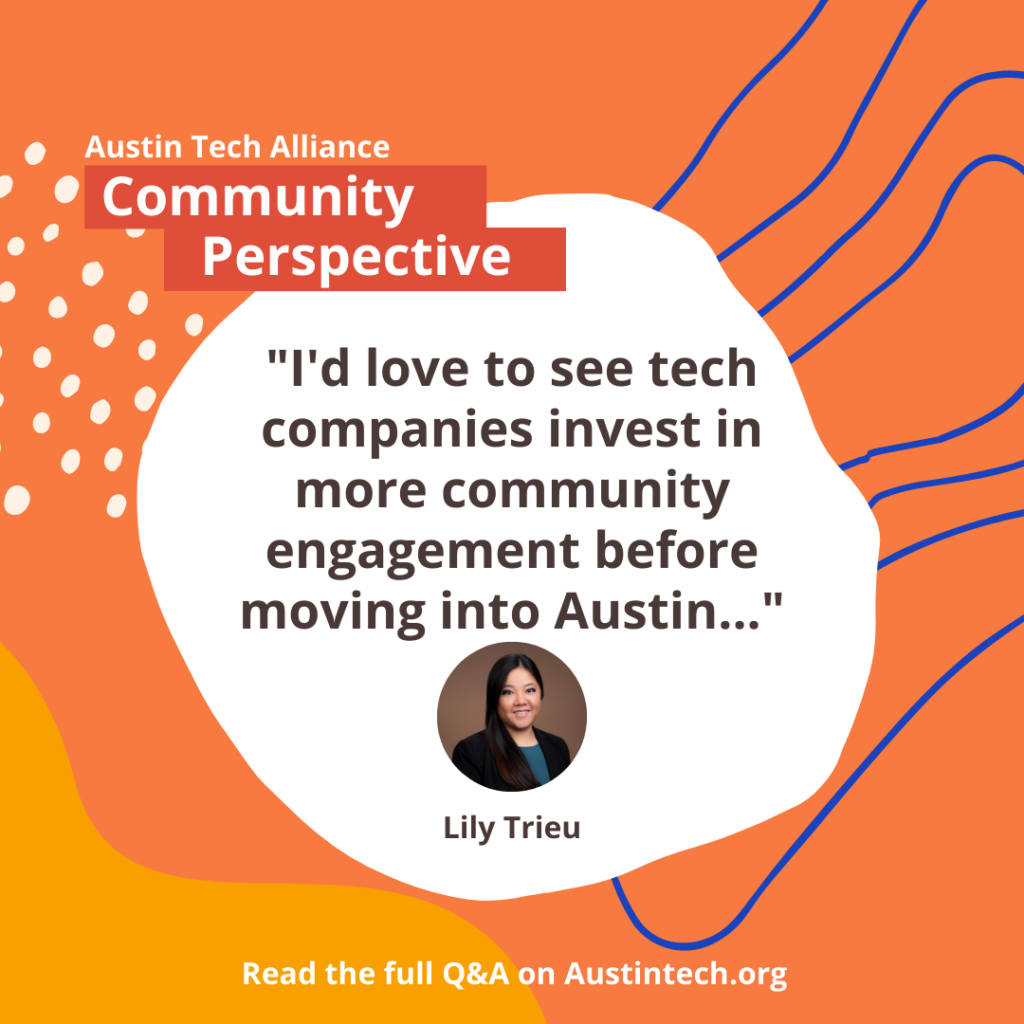The fourth in our series, this week we share Community Perspective from Lily Trieu.
Hey, there! Who are you and how do you identify?
My name is Lily Trieu (she/her) and I am the Interim Executive Director of Asian Texans for Justice (ATJ or @Asiantexansforjustice on Instagram), a nonpartisan, nonprofit with a mission to connect Asian Texans of all identities to meaningful civic action to build personal and political power for future generations.
How engaged are you in current Austin policy and government?
Aside from my role with ATJ, I’m an active community member. I currently serve as a commissioner on the Library Commission representing District 1. I’m also the VP of Communications with Ballet Austin Guild, board member of New Leaders Council, and a Leadership Austin alumni. As a result, local policy and government is a huge part of how I show up in professional and personal spaces. Whether it’s racial equity, performing arts, or community services to all parts of Austin, policy and government drives all of the decisions we experience.
How do you value or use technology in your day to day and with work?
Technology is deeply woven into everything we do. Much of how ATJ engages with our stakeholders is via technology – whether it’s a text message to remind them to vote, providing resources on our website, or using social media to call people to action, we rely on technology as a way to communicate and serve our community. Especially given the impacts of COVID-19 over the last couple of years, technology was one of the most important ways for us to continue to engage with the Asian American community to understand where there are unmet needs.
It’s been shared that tech jobs are contributing to gentrification and pushing out Central Texas’ people of color. What changes do you think might help to mitigate these rapid changes within the Austin tech community and through city policy?
As someone who has watched Austin grow from the early 2000s to the present day, it is certainly exciting to see the growth and excitement of the city. Unfortunately, Austin has seen how rapid growth without equitable investments into communities of color can lead to gentrification and decreased diversity. Without diversity, Austin inherently loses much of what makes it special. I’d love to see tech companies invest in more community engagement before moving into Austin to best understand the potential impacts of being here – aside from job creation. Even tech companies who have long existed in Austin can often play a bigger role in community engagement, working alongside nonprofits and community leaders to invest in resources like community health centers, improved educational opportunities, and providing more food access. Our city policy can and should continue to address the growing cost of housing and the ongoing homelessness crisis. Investments in community centers, resources centers, and improved infrastructure should concentrate in communities of color – where many live in food deserts, without access to healthcare, and lack access to basic public transportation.
What future do you imagine for the Austin community as a whole?
Austin is a beautiful city with the potential to truly be welcoming for all people. As a statewide organization, ATJ seeks to empower Asian Texans to engage in civic action and we hope that to be true for all community members. We are hopeful that Austin is a community where all persons are civically engaged – whether it be voting, volunteering, or donating to your favorite local nonprofits. Most importantly, we hope that Austinites are open hearted and think not only of their families or most proximate neighbors but also of those with the most need. The future of Austin that I imagine is one in which every Austinite and their family has the ability to be healthy and thrive.
It’s April, we’re in warmer weather, and in the third year of the Covid-19 virus affecting our community. Do you have any thoughts you want to share on any of these subjects?
As we welcome spring in Austin, it’s been exciting to see how the city is coming alive again. Many events that were missed over the last couple of years are back – and with that we can restrengthen our community relationships. However, it is also important to note that COVID-19 continues to have deep impacts on healthcare workers and those who are immunocompromised. We’d also be remiss to not note that in the March primary, a substantial number of ballots were rejected due to more restrictive voting laws in Texas. As many are finding relief in returning to old ways of engaging, things are not the same as they were at the start of 2020 and we should be thoughtful about how we can work together towards a better future – one in which everyone can be safe and civically participate.
Thanks for sharing, Lily!
Be sure to check out Asian Texans for Justice to follow her work.

